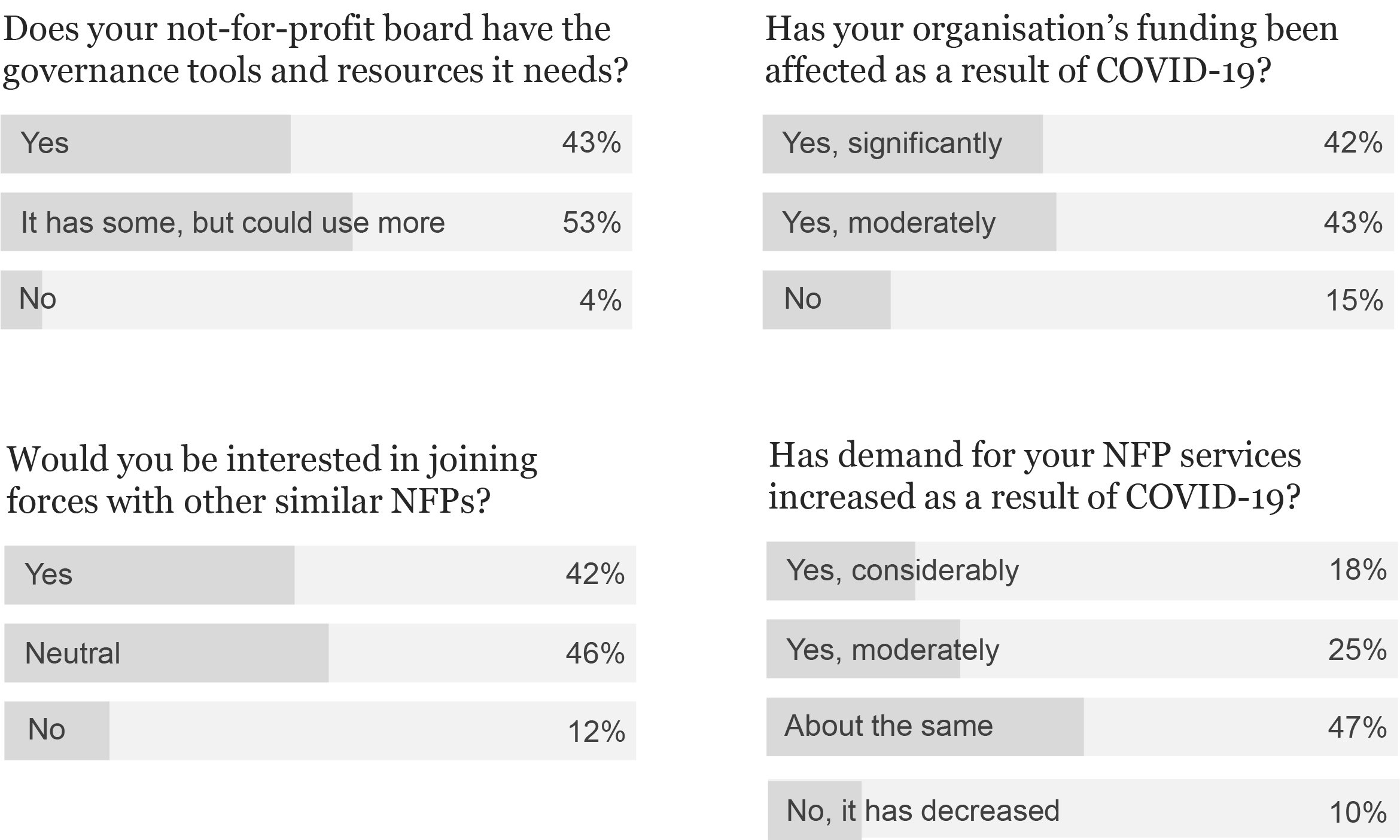Why inclusion belongs in the boardroom
Pride Month is a reminder that LGBTQIA+ inclusion isn’t just the right thing to do – it’s good governance.
We asked our members who sit on NFP boards how their organisation was doing through COVID-19.

Eighty-five percent of IoD directors on not-for-profit boards say COVID-19 has moderately or significantly affected funding for their organisation.
In a pulse check of members over two weeks in July 2020, we sought to understand changes directors in the NFP sector have observed to date this year.
Most NFP organisations have been impacted by COVID-19 with only 15% of the directors who responded to our poll indicating the pandemic has so far made no difference to their organisation's funding.
Of the 163 directors who responded to our questions, about half (53%) believe they have the governance tools and resources they need, but could use more.
Interestingly, 47% of member respondents think demand for the services their NFP organisation provides has remained about the same through the coronavirus pandemic, with 10% indicating a decline in demand.

About half of our 9000 IoD members serve on boards of not-for-profit organisations.
We asked three IoD members for their personal insights about the situation for the NFP organisations they serve on.
“Usual operations were significantly disrupted during the alert levels, and I think most organisations needed to take extra time to manage these unexpected transitions and impacts on staff. These demands were no different for not-for-profits, except the skinny budgets which are common in the not-for-profit sector did make this a key focus of business continuity discussions.
“With one of the organisations I am involved with there was a noticeable additional demand on the trustees and committee members during the lockdown, and to help us get back on track afterwards. I do wonder if this will make it difficult for this purely volunteer organisation to keep up motivation for making all of the funding applications we need to keep our projects humming. Given that funding availability is likely to become tighter in the medium term, I have some concerns that this organisation will actually feel the impacts of COVID-19 the most in the next financial year.
“In my view a 'rainy day fund' is essential to ensure the health of our not-for-profit organisations through any difficult period, particularly these types of black swan events. Of course this isn't easy when there is little leeway in budgets, and even more difficult to put forward in terms of a funding proposal. It would be great to see our funding organisations rewarding groups who are being proactive with financial planning, and for funders to consider providing a small amount of 'top up' to project funding to support this approach.
“I want to say a big thank you to everyone who makes a contribution to the not-for-profit sector, it is an essential part of our community.
“If our leaders in governance continue to bring their insights on good governance practice to even one not-for-profit organisation each, I am hopeful that their patient guidance and support for the other volunteers around them, will help to grow new and diverse talent for governance roles in the commercial sector.”
“I am significantly involved as a trustee of two different charities – the impact contrast has been stark. One which generates a significant portion of its operational revenue from running large scale public events has been severely economically impacted. The other has had very moderate impacts.
“The results of this pulse check confirm to me that impacts of COVID-19 have been similar in the NFP/charity sector as they have been in the commercial sector – variable across different entities and overlaid with a high degree of ongoing uncertainty.
“We have a very broad range of entities in our NFP/charity sector in Aotearoa, with significant differences. These differences include areas of operational activity, source and variety of revenue streams, standalone or part of a wider structure, balance sheet strength, to name but a few.
“It is too simplistic an approach to try and generalise about them all together. I suspect that some will even do better out of this environment as it may put much more focus on their particular area, for example, charities involved with food security and mental health are two areas where there are examples of significantly increased levels of support.
“I am concerned about our whole economy of which NFP/charities are just one part. I believe many people are underestimating the likely impact of the downturn we are heading into. In one sense many NFP/charities have an advantage that many businesses don’t; that is they will continue to be supported by donors and supporters because of their noble cause which will aid their survival. That is not to say that they will thrive, but this level of stakeholder support is likely to be just enough in many cases to allow them to survive and limp along. However, unlike the GFC which saw very few NFP/charities fail, I believe this economic impact will be greater and we may well see some NFP/charities not be able to survive this time.
“COVID-19 and the economic downturn to follow have provided a burning platform for change. In essence it has sped up a decade’s worth of slow change that was needed if many of our organisations in the sector were to be able to adapt and survive. Now this change is likely to be needed within the next 12 to 24 months if some organisations are to survive.
“I am concerned that there is often not the level of urgency and reality of the need to change in some NFP/charities compared to businesses. Sometimes one notices an almost entitlement mentality within the sector. This misguided ‘right to survival’ mentality is a real risk to their survival.
“Organisations need to be really clear on their uniqueness and positive impact. Those that can focus, measure, and communicate this the clearest will be the organisations that are supported into the future.
“Don’t overlook the opportunities! Operating through lockdown has already proven new lighter, cheaper and more efficient ways of operating for many organisations. It has also shown the power of collaborations with other organisations, and the power of being organisationally nimble. The sector must not lose these learnings and benefits.”
“This period has highlighted the need for NFP boards to be very familiar with their financial position. Good governance, board reporting and forecasting has never been more important. The need to build reserves should be given a high priority.
“Government support for some NFPs has been timely and the difference between continuing operating or closing. Wage subsidies and ‘one-off’ grants have replaced a lot of ‘regular’ funding. However, my observation is that the timeliness of these was somewhat dependent upon the area in which the NFP works. Those delivering or supporting ’social’ services received support earlier while those in recreational areas came later.
“In a number of instances government funders have been relaxing delivery requirements under contracts thereby allowing income to be retained despite delivery being outside of scope (or not at all). The decline (or ceasing) of Gaming Trusts grants had a severe effect on (particularly) recreational NFP’s financial positions. Although funds have started to flow again, my observation is that Gaming Trusts are wary about funding anything that government may ultimately fund.
“I am feeling cautiously optimistic for a number of reasons. In the bigger picture it appears that New Zealand has the crisis under control and life is returning to normal. Secondly, the crisis has forced a rethink on ways to do things better and more efficiently and, if continued, this may drive cost structures down further than they have been historically.
“The role of governance professionals at a time like this is critical to NFPs. Bringing your skills and disciplines to the board table at these times is the reason that we all join boards - to make a difference. And despite the focus on financial survival, which is obviously important, we shouldn’t forget the reason that the NFP exists - whether it be health, social delivery, recreation or something else. The purpose of the organisation will outlive the crisis if we govern correctly.”